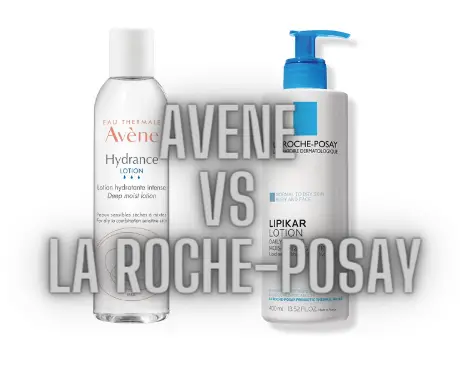When it comes to skincare, choosing the right brand and products can significantly impact the health and appearance of your skin. Avene and La Roche-Posay are two renowned skincare brands that have gained popularity for their dermatologist-recommended formulations. In this comprehensive comparison, we will explore the key aspects of Avene and La Roche-Posay, including their backgrounds, product offerings, ingredients, effectiveness, and suitability for various skin types. By the end, you should have a better understanding of which brand may be the best fit for your skincare needs.
I. Background Information
Avene is a French skincare brand that has been committed to dermatology and hydrotherapy since 1743. The brand draws its products from the Avene Thermal Spring Water, known for its soothing and anti-irritant properties. Avene offers a range of skincare products, including cleansers, moisturizers, serums, and sunscreens, tailored for sensitive and intolerant skin.
La Roche-Posay is another French skincare brand that focuses on creating effective and safe skincare solutions. The brand collaborates with dermatologists to develop formulations that are well-tolerated by even the most sensitive skin types. La Roche-Posay offers a comprehensive range of products, including cleansers, moisturizers, serums, sunscreens, and specialized treatments for various skin concerns.
Product Offerings
Avene provides a wide array of products designed to address the needs of sensitive and intolerant skin. Their product line includes the following:
- Cleansers: Avene offers gentle cleansers that effectively remove impurities without stripping the skin’s natural moisture barrier.
- Moisturizers: Avene moisturizers focus on hydration, nourishment, and skin barrier repair.
- Serums: Avene serums are concentrated formulations that target specific skin concerns like aging, dullness, and hyperpigmentation.
- Sunscreens: Avene’s sun care range includes broad-spectrum sunscreens that provide protection against UVA and UVB rays.
- Specialized Treatments: Avene offers specialized products like masks, exfoliators, and eye care treatments to address specific skin needs.
La Roche-Posay provides a comprehensive range of skincare products suitable for different skin types and concerns. Their product line includes:
- Cleansers: La Roche-Posay offers gentle cleansers that effectively remove dirt, oil, and impurities from the skin.
- Moisturizers: La Roche-Posay moisturizers focus on hydration, skin barrier repair, and addressing specific concerns like acne or aging.
- Serums: La Roche-Posay serums are formulated to target specific skin concerns such as wrinkles, dark spots, and uneven texture.
- Sunscreens: La Roche-Posay’s sun care range includes broad-spectrum sunscreens with various formulations to cater to different preferences.
- Specialized Treatments: La Roche-Posay offers specialized treatments for conditions like acne, rosacea, and eczema, including spot treatments, soothing creams, and targeted serums.
Avene vs La Roche-Posay Ingredients
Avene products often feature the key ingredient Avene Thermal Spring Water, known for its soothing and anti-irritant properties. Some common ingredients found in Avene products include:
- Glycerin: A humectant that helps to attract and retain moisture in the skin.
- Shea Butter: A rich emollient that provides intense hydration and nourishment.
- Sodium Hyaluronate: A hydrating ingredient that helps to plump and moisturize the skin.
- Avene Thermal Spring Water: Known for its soothing and calming properties, it helps to reduce skin sensitivity and irritation.
La Roche-Posay products often incorporate key ingredients known for their effectiveness and tolerance. Some common ingredients found in La Roche-Posay products include:
- Niacinamide: A vitamin B3 derivative that helps to improve the skin’s barrier function, reduce redness, and regulate sebum production.
- Thermal Spring Water: Similar to Avene, La Roche-Posay also utilizes thermal spring water known for its soothing and antioxidant properties.
- Salicylic Acid: A beta-hydroxy acid that helps to exfoliate the skin, unclog pores, and reduce acne breakouts.
- Vitamin C: An antioxidant that brightens the skin, promotes collagen production, and protects against environmental damage.
Effectiveness and Suitability for Skin Types
Avene products are formulated with a focus on gentleness and tolerance, making them suitable for sensitive and intolerant skin. The brand is known for its ability to soothe, hydrate, and protect theskin. The Avene Thermal Spring Water in their products provides a calming effect, reducing redness and irritation. Avene products have shown effectiveness in improving the skin’s hydration, restoring the skin barrier, and addressing sensitivity-related concerns. They are often recommended for individuals with dry, sensitive, or reactive skin.
La Roche-Posay products are also designed with a focus on sensitivity and effectiveness. Their formulations are well-tolerated and suitable for sensitive skin types, including those with conditions like acne, rosacea, and eczema. La Roche-Posay products have shown efficacy in addressing various skin concerns, such as acne, aging, hyperpigmentation, and dehydration. The brand’s emphasis on dermatological research and collaboration with dermatologists has contributed to its reputation for producing effective and gentle skincare solutions.
Final Thoughts
Both Avene and La Roche-Posay are reputable skincare brands that offer a wide range of products suitable for sensitive skin types. Avene’s long-standing commitment to hydrotherapy and the use of Avene Thermal Spring Water sets it apart, focusing on soothing and calming sensitive skin. La Roche-Posay, on the other hand, prides itself on collaborating with dermatologists to develop effective and well-tolerated formulations for various skin concerns.
Ultimately, the choice between Avene and La Roche-Posay depends on individual preferences, specific skin concerns, and personal experiences. It is crucial to consider the ingredients, product offerings, and effectiveness of each brand when selecting skincare products. Additionally, consulting with a dermatologist or skincare professional can provide valuable insights and guidance in choosing the most suitable products for your skin type and concerns.
Remember, skincare is a highly personal journey, and what works for one person may not work for another. It’s essential to listen to your skin, observe how it responds to different products, and make informed decisions based on its needs. With the right skincare routine and products, you can achieve healthy, balanced, and radiant skin.

